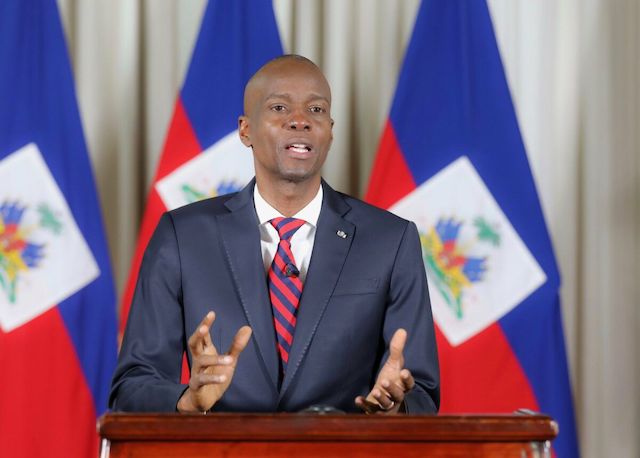The investigative judge charged with overseeing the multinational probe into last month’s shocking assassination of Haitian President Jovenel Moise has quit the case.
Judge Mathieu Chanlatte recused himself on Friday, just four days after being handed the case, and two days after one of his court clerks was found dead in a local hospital under circumstances that remain unclear.
Chanlatte cited safety concerns and a lack of support to carry out such a high-profile and difficult investigation, Magistrate Bernard Saint-Vil, the dean of the Court of First Instance in Port-au-Prince, told The Miami Herald.
Saint-Vil had named Chanlatte to oversee the case on Monday.
Read Also: Letter Addressed To Pope Containing Bullets Intercepted
Saint-Vil said he received the investigative judge’s signed letter on Friday afternoon.
“I now have to find another judge,” Saint-Vil said, expressing the hope that he could name a new investigative judge by early next week.
Late Friday, Chanlatte confirmed his decision to step away from the case.
“I decided to make this decision because all the authorities who had to provide for my needs in terms of personal security did not respond favorably to my requests after a week of going and coming incessantly to them,” he told The Miami Herald.
In Haiti, an investigative or instructing judge works much like a grand jury.
It is up to him or her to take over the investigation where police left off and ultimately bring charges in the case.
Security concerns are common in high-profile cases in Haiti, where investigative judges in the past have been forced to flee for the U.S. and Canada because of death threats.
Two judges and court clerks involved in documenting evidence in the case reported receiving death threats and pressure to fabricate reports, and before Chanlatte’s selection, a number of judges had expressed concerns about their security if they were to be assigned the case.
Saint-Vil said Chanlatte brought up his security and a lack of support during a conversation both men had Friday morning.
“He said that he, his wife and two daughters were sleeping in a house and up until now, he had not received any security, he had not received an armored vehicle, or anything, and that he was going to recuse himself,” Saint-Vil said.
Saint-Vil said he had requested extra security since last week in a meeting with his boss, the country’s justice minister.
“He said he had spoken to the director general of the police and he said he would provide security, and it was never made available,” Saint-Vil said.
“They said they were going to send him an armored vehicle and it never arrived.”
Meanwhile, The National Association of Haitian Registrars is asking for an investigation into the death of Ernst Lafortune, Chanlatte’s deceased court clerk. The organization asked Haiti’s justice minister, Rockefeller Vincent, to secure the safety of clerks working on sensitive cases.
A Haiti National Police official dismissed Chanlatte’s lack of security claims, telling the Herald that “he selected himself, his own security guards.”
The official did not want to be named, citing the sensitive nature of the assassination plot.
Haitian police have arrested 44 individuals, including 18 Colombian commandos, four Haitian Americans and 20 Haitian nationals.
Of the Haitian nationals, 20 are police officers, including the coordinator of the president’s security and the head of the General Security Unit of the National Palace, or USGPN.
The motive for the brazen July 7 killing, which also left first lady Martine Moise, seriously wounded, remains baffling – along with who financed and ultimately authored the crime.
Under Haitian law, Chanlatte had three months to investigate the murder and call witnesses in hopes of figuring out who killed the president.
His appointment, however, quickly stirred controversy in Haiti’s legal circles because of several other high profile cases he had overseen.
One of those cases involved a corruption complaint filed against first lady Martine Moise, the director general of the National Identification Office, Jude Jacques Élibert, and several other former government ministers.
The case centered on a no-bid contract between Haiti and the German company Dermalog for the manufacturing of new biometric identification cards that also double as voting cards.
Jean Wilner Morin, president of the National Association of Haitian Magistrates, expressed the belief that the media criticism and lack of security were all factors in Chanlatte’s decision.
But security and means, Morin said, remain critical and will continue to plague the probe if both are not addressed.
“For a judge to feel that he has the serenity to take on a case like this, he has to have the guarantee that the authorities are determined for light to be shed on the case.
“There cannot be any blockages,” president of the Haitian judges association said.
“If you have a judge on this case and he lacks the means to carry it out, it’s as if they have blocked the investigation,” he added.
Morin said: “The justice minister needs to quickly meet with the dean and decide on what kind of support they are going to give the judge selected to oversee the case.”
He added that with the circumstances surrounding Moise’s death still unclear and confusing,
Haitian authorities “need to provide all that is necessary in order for a judge to work because a case like this will require a lot of specialists and expertise.” (tca/dpa/NAN)

